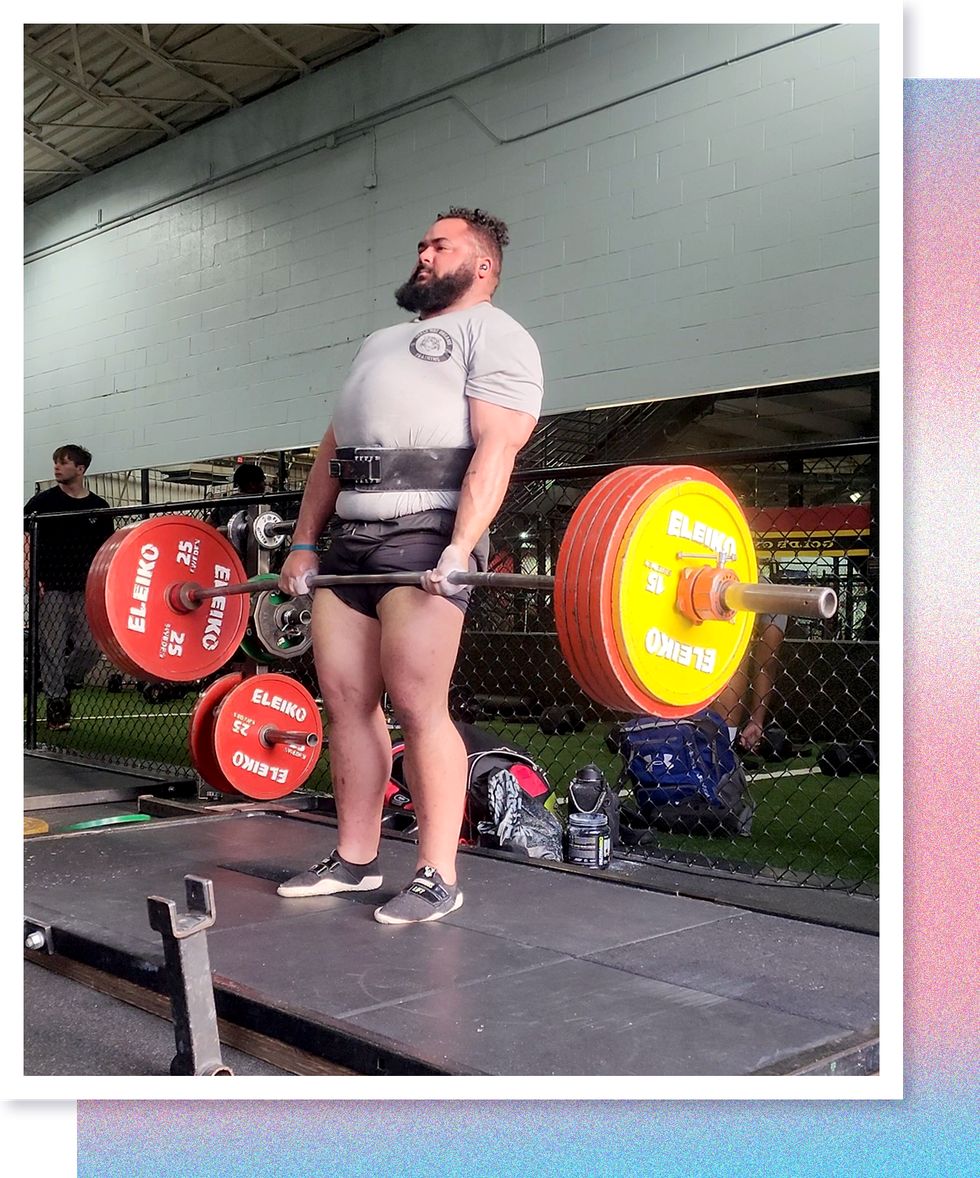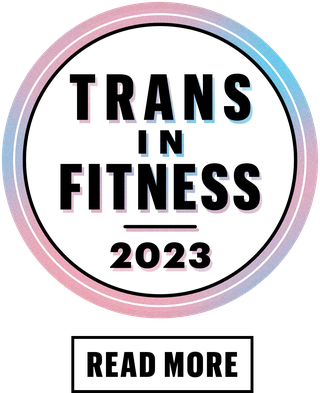This story is part of Trans in Fitness—a series of profiles that highlights the fitness changemakers who are making the world easier and healthier for their community. Read the rest of the inspiring stories here.
GROWING UP IN Virginia, Scott Percy played soccer and rugby, but his interest in sports dwindled as he entered young adulthood. In 2016, at the age of 23, Percy got back in the game. This time, though, he wasn’t out on the field. Percy found a home at the gym.
“One day, me and a friend were talking, and he asked me if I’d heard of powerlifting,” Percy says. He hadn’t. “My little ADHD brain decided to scratch that itch, and that itch is not going away.”
Powerlifting emerged from strength training practices around the world, from Ancient Egypt—where lifting sacks of sand was a common fitness practice—to Ancient Greece—where Spartans lifted rocks to train for war. Modern powerlifting began informally in the 1950s, when Olympic weightlifters challenged each other to complete “odd lifts” at the heaviest possible load. Today, powerlifting tests competitors’ brute strength by focusing on three barbell lifts: the squat, the bench press, and the deadlift. At powerlifting meets, competitors have three attempts to achieve maximal weight on each lift. The sport requires power, focus, and dedication—and Percy has all three.
Before he got into powerlifting, Percy was struggling. “I didn’t have any real direction in my life, but I knew I wanted to give back to my community in some form,” he says. Powerlifting gave Percy a purpose. Now the Baltimore-based, 30-year-old athlete trains five days a week, coaches other powerlifters, and regularly travels to powerlifting meets.
Percy, who’s a transgender man, competed for the first time in Atlanta, Georgia, at an unsanctioned meet organized by the International Association of Trans Bodybuilders and Powerlifters. (“Sanctioned” meets are held by official powerlifting federations and can serve as qualifying events for national or international competitions; “unsanctioned” meets are held by other organizations and tend to have fewer regulations.)
“I really just wanted to get my feet wet and see if I wanted to do this,” Percy says. “From the moment I hit my first squat, it was like falling in love, and I knew from that moment on that powerlifting was what I wanted to do.”
This was Percy’s first and only powerlifting meet where he exclusively competed against trans athletes. Now Percy competes against cisgender men.
Percy doesn’t always disclose that he’s trans at powerlifting meets, and—depending on each meet’s guidelines—he doesn’t have to. Since Percy has been on gender-affirming hormone replacement therapy for years, most people assume he’s just another cisgender guy. “Because I pass 100 percent of the time, nobody’s going to be the wiser, even when I take my shirt off,” he says.
These days, when he does choose to disclose this part of his lived experience, Percy is more discerning than ever before—not necessarily by choice. “With today’s political climate, I have to actually start worrying about safety,” he says. “If I go to Ohio, for example, I won’t announce ‘Hey, I’m trans. This is who I am,’” he says. “It really just depends on the social atmosphere.”
Ohio is just one of 45 states that have proposed anti-trans legislation this year, and Percy doesn’t understand the hate.
“We pay taxes. We have jobs. We’re literally all the same at the end of the day,” he says. “So why is there so much hate towards us for wanting to live our own lives? What we do to our bodies doesn’t affect you, so why does it matter?”
In addition to laws banning or heavily restricting gender-affirming medical care, state laws and athletic governing bodies are barring transgender athletes from participating in sports, including powerlifting.
USA Powerlifting has banned transmasculine competitors who take testosterone from competing in their meets. The organization has also banned transgender women from participating in women’s powerlifting competitions—although some of these guidelines no longer apply to USA Powerlifting meets in Minnesota, thanks to a successful discrimination lawsuit from trans powerlifter JayCee Cooper. While meets sanctioned by the International Powerlifting Federation allow transgender athletes to compete, those athletes must undergo a strict vetting process, which may include submitting bloodwork, medical reports, and a passport with an updated gender marker.
Despite attempts to restrict trans participation in powerlifting, there are unsanctioned powerlifting meets that allow and encourage trans participation, and there are LGBTQ-centered events like the Gay Games with explicitly trans-inclusive policies. Still, that doesn’t change the crushing reality that sports, schools, and entire states are becoming increasingly hostile towards transgender people. Through it all, Percy tries to stay positive and focus on his training.
“Powerlifting has taught me how to have self-motivation,” he says. “Every day I think, ‘I’m here today, I’m going to make the best of this day, and I’m going to put my head down and do what I need to do.’”
Percy relied on that optimism when he faced a major setback in his training. In September 2020, Percy was rear-ended while driving in his truck, and the accident resulted in a serious back injury. This could have been career-ending, but Percy dedicated himself to healing and maintained a positive attitude, despite having no caregivers during his six month recovery.
“I was motivated to get back to being even healthier than I was before,” he says—and the motivation paid off. Percy attended physical therapy three to four times a week and had to take six months off of training, but when he finally reentered the powerlifting world, Percy was stronger than ever.
At a 2021 powerlifting meet, Percy became the World’s Strongest Trans Man, beating Australian trans competitor Jaxson Wearing’s record of a 1289.7 score with a total of 1295. Percy still holds that title today.
“There’s no other trans man in the world putting up the same numbers that I’ve been putting up,” Percy says. “I’m 100 percent willing to give the title up, but for now, nobody has shown they can.”
Currently, Percy is training for the Gay Games, a worldwide, LGBTQ+ sporting event founded in 1982. This year’s Gay Games will be held in November in Hong Kong, China, and in Guadalajara, Mexico. Percy will compete in Guadalajara. The Gay Games will be Percy’s first international meet, and he’s training hard.
“You know the saying, ‘You’re only as strong as your weakest muscle?’ Well, the truth is, it’s just a whole lot of reps,” Percy says. “I’m doing legs three times a week, I hit my upper body twice a week, and then I’m just focusing on a lot of recovery. I’m dialing in my nutrition, making sure I’m getting enough water for the day—because this is probably going to be the most important meet of my entire life.”
When he isn’t focusing on his own training, Percy trains other powerlifters through his coaching business, the Laumei House of Strength, and many of his clients are trans. Currently, coaching is something Percy does alongside his full-time job, but he plans to make coaching his career in the future.
In addition to typical powerlifting training, Percy offers services specifically tailored to transmasculine people, such as pre- and post-op chest training for clients who are undergoing top surgery. With his trans-inclusive services and his personal experience as a trans powerlifter, Percy creates a comfortable training environment for his trans clients—and he inspires them to be their strongest, most confident selves.
Skyler Berhim found Percy on Instagram through the hashtag #ftmfitness (“FTM” is an acronym used by some transgender people to refer to “female-to-male” transition). “I thought, ‘Wow, a guy like me pushing weight like that? That’s inspiring,” Berhim says. “I’d been looking for a trans strength training coach for about a year. After a few months of following [Percy] online, I approached him about coaching.”
Berhim has been training with Percy for two years, and under Percy’s guidance, Berhim says he’s made both physical and mental progress. “Training under Scott made me realize that I could be a competitive athlete,” Berhim says. “I no longer see myself as a trans guy who enjoys working out, but as someone who is capable of making queer sports history. That change is there because of a seed he planted.”
Rhett, another client who’s been training with Percy since 2020, agrees. “[Working with Scott] has helped me become more confident in myself—in training and in my personal life,” Rhett says. “He pushes me to be a better version of myself.”
Percy is deeply invested in supporting his clients. Berhim recalls a time when he had a powerlifting meet that was an eight hour drive from Percy’s home. Despite the long commute, Percy showed up—and he coached Berhim through the entire event. “It wasn’t even a question if he would be there,” Berhim says. “This man drove through most of the night so he could handle me at my meet all day. His commitment to his athletes is unwavering.”
Someday Percy hopes to open his own gym that welcomes people of all genders. For now, he’ll continue competing, coaching, and encouraging other trans men to get involved in powerlifting.
“Just do it,” he says. “I don’t want to be all cliché and take Nike’s motto, but really—just go out there and do it. If I’d found powerlifting earlier in my life, I would be a lot further along than I am now, but I’m glad I did it, because powerlifting has taught me a lot of discipline.”
Ro White is a Chicago-based writer, sex educator, and Autostraddle’s Sex & Dating Editor.








Comments are closed.